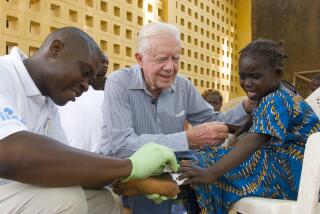U.N. Agency Pushes Drive to Improve World Health
- Share via
GENEVA — Starving people who were relocated from northern Ethiopia’s famine belt to the more fertile south are dying anyway--from malaria.
That tragic irony, brought to light in recent reports from the African nation, underlines a fundamental dilemma of economic development.
As World Health Organization official Warren Furth explained: “We talk about an energy crisis--oil, fuel--but we don’t talk enough about human energy. How can a country develop economically and socially when three-quarters of its population have some sort of parasitic disease, suffering from malaria, schistosomiasis, sleeping sickness and so on?”
8th Year of Program
The U.N.-affiliated WHO, which has its headquarters in this Swiss city, is in the eighth year of an ambitious program, “Health for All by the Year 2000.” The target: to make basic health care accessible to everyone in the Third World by the turn of the century.
Medical science and international mobilization have already scored important victories.
“Smallpox was a real scourge, but it has been wiped out,” Jacques Hamon, a WHO assistant director-general, noted. “And we have made great progress against diseases that can be prevented by immunization, such as yellow fever, measles, polio, tetanus.”
The World Health Organization is sponsoring a worldwide effort to immunize all children against diphtheria, measles, polio and three other communicable diseases by 1990. It is estimated that less than 20% are now immunized.
In one dramatic episode, the government and guerrillas in El Salvador last February called a one-day truce in their civil war so that 400,000 children could be vaccinated.
Infant Deaths Drop
Statistics tell of a healthier world. In 35 low-income countries, the infant mortality rate--the number dying before age 1--declined from 122 per thousand in 1965 to 75 in 1983, the World Bank reports.
But that rate is still seven times greater than in industrialized nations. The high infant mortality is caused by a combination of factors: Malnourished, overworked mothers and too-frequent pregnancies produce underweight infants, who then are susceptible to diseases, especially those transmitted by unsafe drinking water.
“Proper sanitation, clean water, sewage disposal--more than medical science--these things would help the general health conditions of the population,” said Furth, a World Health Organization assistant director-general.
Malaria Persistent
For health officials, one disease--malaria--symbolizes their greatest disappointments and hopes.
In the 1960s, DDT spraying seemed about to wipe out the debilitating, mosquito-borne parasitic disease. However, mosquitoes grew resistant to the insecticide, the parasite grew resistant to preventive drugs, and the World Health Organization now warns that it is “becoming increasingly difficult to cope with the disease.”
Hope persists nonetheless. Researchers report encouraging progress on an anti-malaria vaccine. Said an optimistic Furth, “I would think that in 20 years you could really bring malaria under control.”
More to Read
Sign up for Essential California
The most important California stories and recommendations in your inbox every morning.
You may occasionally receive promotional content from the Los Angeles Times.










